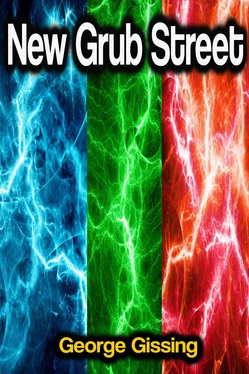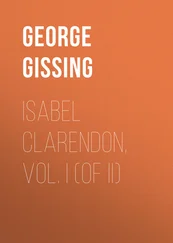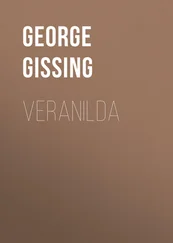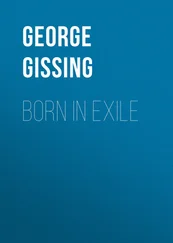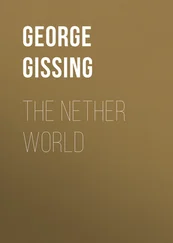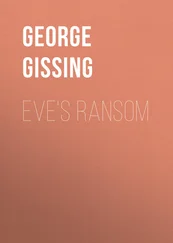George Gissing - New Grub Street
Здесь есть возможность читать онлайн «George Gissing - New Grub Street» — ознакомительный отрывок электронной книги совершенно бесплатно, а после прочтения отрывка купить полную версию. В некоторых случаях можно слушать аудио, скачать через торрент в формате fb2 и присутствует краткое содержание. Жанр: unrecognised, на английском языке. Описание произведения, (предисловие) а так же отзывы посетителей доступны на портале библиотеки ЛибКат.
- Название:New Grub Street
- Автор:
- Жанр:
- Год:неизвестен
- ISBN:нет данных
- Рейтинг книги:3 / 5. Голосов: 1
-
Избранное:Добавить в избранное
- Отзывы:
-
Ваша оценка:
- 60
- 1
- 2
- 3
- 4
- 5
New Grub Street: краткое содержание, описание и аннотация
Предлагаем к чтению аннотацию, описание, краткое содержание или предисловие (зависит от того, что написал сам автор книги «New Grub Street»). Если вы не нашли необходимую информацию о книге — напишите в комментариях, мы постараемся отыскать её.
New Grub Street — читать онлайн ознакомительный отрывок
Ниже представлен текст книги, разбитый по страницам. Система сохранения места последней прочитанной страницы, позволяет с удобством читать онлайн бесплатно книгу «New Grub Street», без необходимости каждый раз заново искать на чём Вы остановились. Поставьте закладку, и сможете в любой момент перейти на страницу, на которой закончили чтение.
Интервал:
Закладка:
He looked up suddenly, and added:
‘I am speaking as if to myself. You, of course, don’t misunderstand me, and think I am accusing my wife.’
‘No, I don’t take you to mean that, by any means.’
‘No, no; of course not. All that’s wrong is my accursed want of money. But that threatens to be such a fearful wrong, that I begin to wish I had died before my marriage-day. Then Amy would have been saved. The Philistines are right: a man has no business to marry unless he has a secured income equal to all natural demands. I behaved with the grossest selfishness. I might have known that such happiness was never meant for me.’
‘Do you mean by all this that you seriously doubt whether you will ever be able to write again?’
‘In awful seriousness, I doubt it,’ replied Reardon, with haggard face.
‘It strikes me as extraordinary. In your position I should work as I never had done before.’
‘Because you are the kind of man who is roused by necessity. I am overcome by it. My nature is feeble and luxurious. I never in my life encountered and overcame a practical difficulty.’
‘Yes; when you got the work at the hospital.’
‘All I did was to write a letter, and chance made it effective.’
‘My view of the case, Reardon, is that you are simply ill.’
‘Certainly I am; but the ailment is desperately complicated. Tell me: do you think I might possibly get any kind of stated work to do? Should I be fit for any place in a newspaper office, for instance?’
‘I fear not. You are the last man to have anything to do with journalism.’
‘If I appealed to my publishers, could they help me?’
‘I don’t see how. They would simply say: Write a book and we’ll buy it.’
‘Yes, there’s no help but that.’
‘If only you were able to write short stories, Fadge might be useful.’
‘But what’s the use? I suppose I might get ten guineas, at most, for such a story. I need a couple of hundred pounds at least. Even if I could finish a three-volume book, I doubt if they would give me a hundred again, after the failure of “The Optimist”; no, they wouldn’t.’
‘But to sit and look forward in this way is absolutely fatal, my dear fellow. Get to work at your two-volume story. Call it “The Weird Sisters,” or anything better that you can devise; but get it done, so many pages a day. If I go ahead as I begin to think I shall, I shall soon be able to assure you good notices in a lot of papers. Your misfortune has been that you had no influential friends. By-the-bye, how has The Study been in the habit of treating you?’
‘Scrubbily.’
‘I’ll make an opportunity of talking about your books to Fadge. I think Fadge and I shall get on pretty well together. Alfred Yule hates the man fiercely, for some reason or other. By the way, I may as well tell you that I broke short off with the Yules on purpose.’
‘Oh?’
‘I had begun to think far too much about the girl. Wouldn’t do, you know. I must marry someone with money, and a good deal of it. That’s a settled point with me.’
‘Then you are not at all likely to meet them in London?’
‘Not at all. And if I get allied with Fadge, no doubt Yule will involve me in his savage feeling. You see how wisely I acted. I have a scent for the prudent course.’
They talked for a long time, but again chiefly of Milvain’s affairs. Reardon, indeed, cared little to say anything more about his own. Talk was mere vanity and vexation of spirit, for the spring of his volition seemed to be broken, and, whatever resolve he might utter, he knew that everything depended on influences he could not even foresee.
Chapter 7. Marian’s Home
Three weeks after her return from the country—which took place a week later than that of Jasper Milvain—Marian Yule was working one afternoon at her usual place in the Museum Reading-room. It was three o’clock, and with the interval of half an hour at midday, when she went away for a cup of tea and a sandwich, she had been closely occupied since half-past nine. Her task at present was to collect materials for a paper on ‘French Authoresses of the Seventeenth Century,’ the kind of thing which her father supplied on stipulated terms for anonymous publication. Marian was by this time almost able to complete such a piece of manufacture herself and her father’s share in it was limited to a few hints and corrections. The greater part of the work by which Yule earned his moderate income was anonymous: volumes and articles which bore his signature dealt with much the same subjects as his unsigned matter, but the writing was laboured with a conscientiousness unusual in men of his position. The result, unhappily, was not correspondent with the efforts. Alfred Yule had made a recognisable name among the critical writers of the day; seeing him in the title-lists of a periodical, most people knew what to expect, but not a few forbore the cutting open of the pages he occupied. He was learned, copious, occasionally mordant in style; but grace had been denied to him. He had of late begun to perceive the fact that those passages of Marian’s writing which were printed just as they came from her pen had merit of a kind quite distinct from anything of which he himself was capable, and it began to be a question with him whether it would not be advantageous to let the girl sign these compositions. A matter of business, to be sure—at all events in the first instance.
For a long time Marian had scarcely looked up from the desk, but at this moment she found it necessary to refer to the invaluable Larousse. As so often happened, the particular volume of which she had need was not upon the shelf she turned away, and looked about her with a gaze of weary disappointment. At a little distance were standing two young men, engaged, as their faces showed, in facetious colloquy; as soon as she observed them, Marian’s eyes fell, but the next moment she looked again in that direction. Her face had wholly changed; she wore a look of timid expectancy.
The men were moving towards her, still talking and laughing. She turned to the shelves, and affected to search for a book. The voices drew near, and one of them was well known to her; now she could hear every word; now the speakers were gone by. Was it possible that Mr Milvain had not recognised her? She followed him with her eyes, and saw him take a seat not far off; he must have passed without even being aware of her.
She went back to her place and for some minutes sat trifling with a pen. When she made a show of resuming work, it was evident that she could no longer apply herself as before. Every now and then she glanced at people who were passing; there were intervals when she wholly lost herself in reverie. She was tired, and had even a slight headache. When the hand of the clock pointed to half-past three, she closed the volume from which she had been copying extracts, and began to collect her papers.
A voice spoke close behind her.
‘Where’s your father, Miss Yule?’
The speaker was a man of sixty, short, stout, tonsured by the hand of time. He had a broad, flabby face, the colour of an ancient turnip, save where one of the cheeks was marked with a mulberry stain; his eyes, grey-orbed in a yellow setting, glared with good-humoured inquisitiveness, and his mouth was that of the confirmed gossip. For eyebrows he had two little patches of reddish stubble; for moustache, what looked like a bit of discoloured tow, and scraps of similar material hanging beneath his creasy chin represented a beard. His garb must have seen a great deal of Museum service; it consisted of a jacket, something between brown and blue, hanging in capacious shapelessness, a waistcoat half open for lack of buttons and with one of the pockets coming unsewn, a pair of bronze-hued trousers which had all run to knee. Necktie he had none, and his linen made distinct appeal to the laundress.
Читать дальшеИнтервал:
Закладка:
Похожие книги на «New Grub Street»
Представляем Вашему вниманию похожие книги на «New Grub Street» списком для выбора. Мы отобрали схожую по названию и смыслу литературу в надежде предоставить читателям больше вариантов отыскать новые, интересные, ещё непрочитанные произведения.
Обсуждение, отзывы о книге «New Grub Street» и просто собственные мнения читателей. Оставьте ваши комментарии, напишите, что Вы думаете о произведении, его смысле или главных героях. Укажите что конкретно понравилось, а что нет, и почему Вы так считаете.
